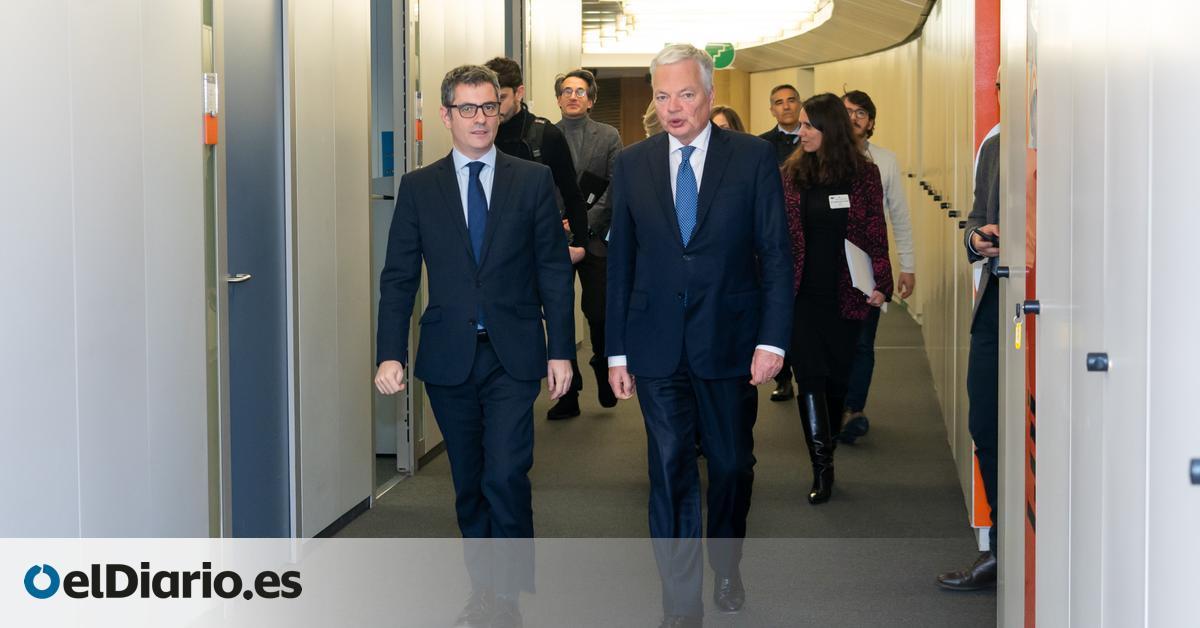
The European Commission reiterates that Spain must proceed with “urgency” to renew the General Council of the Judiciary after five years of blockade. The Commissioner of Justice, Didier Reynders, has insisted that this must be the “priority”, above changing the system of election of the governing body of judges, which is the condition that Alberto Núñez Feijóo sets again. “After five years, renewal becomes increasingly urgent,” Reynders said in a press conference with the Minister of Justice, Félix Bolaños, after participating in a meeting with his European counterparts in Brussels.
“Insist on the renewal and immediately afterwards initiate a reform in line with European standards,” said Reynders on the same day that the PP has threatened to maintain the blockade until the model, which has been in force since 2001 and with the that has controlled the Judiciary for 22 years.
Reynders maintains that the European Commission’s concern is the blockade because it is also affecting the functioning of Justice and has admitted that reforming the system is more complicated than reaching a specific renewal of the governing body of the judges. And he believes that once the electoral period has passed, the political forces must get to work. Sánchez intends to contact Feijóo to address this matter, but the minister has avoided setting a date.
“The European Commission is open to dialogue and, if we receive a proposal that is the subject of an agreement by the political forces in Spain, we will study it,” Reynders said about the possibility of the process being carried out as requested by the PP. But he has recognized that this approach is more difficult: “Reform processes take longer than renewal. That is why we came up with the renovation first and then the reform.”
And for the Commission in all its reports on the rule of law since its first edition in 2020, the concern is the blockage of the Judiciary, so the “priority” is to agree on a new composition for the governing body of judges. .
The socialists have always refused to change the election system before for two reasons: one, because they consider that it is changing the rules of the game in the middle of the party according to what suits the PP, and two, because they maintain that the judicial career already participates in the process. by appointing candidates from whom the legislative branch, by a three-fifths majority, then makes the election.
“Questions and answers” about the amnesty
Reynders and Bolaños have appeared at a press conference monopolized by Spanish affairs with a quite similar speech regarding the amnesty after the minister said after their meeting last week that in Brussels there is “zero concern” about the situation of the state of right and the separation of powers with respect to that proposition of law. The next day, the European Commission responded saying that it had not said “yet” that there was no concern because the analysis of the standard is not finalized and an evaluation will not be made until the text is definitively approved. This time they have avoided the collision and have thrown balls out.
“We are maintaining a continuous, fluid and transparent dialogue to clarify any aspect,” Bolaños admitted on this occasion: “This dialogue is developed with questions and answers.” “We are in a process of total normality with a fluid normal dialogue. That dialogue will continue and on any issue that the European Commission asks us for clarification, we will do so,” he added.
The commissioner also wanted to frame as normal the analysis that his department is carrying out on the amnesty law based on the cascade of letters and complaints that he has received from mainly the political and judicial right. “We have a shared procedure. This is not the first time that we have analyzed a draft text before it is approved,” explained Reynders, who recalled that he first asked to access the text and then “have answers to the questions” posed by the European Commission.
What neither of them have responded to is what type of clarifications the community government needs, although Reynders has referred to his speech in the European Parliament in which he explained that the evaluation would occur once the law was in place. definitively approved to take into account any changes that may be made. “The Commission will carry out this analysis on this bill but will also do so with respect to the amendments that may arise in the parliamentary process and all the texts that have been carried out within the framework of the formation of the Government in Spain. ”Reynders said about the agreements in which the lawfare.
Source: www.eldiario.es

